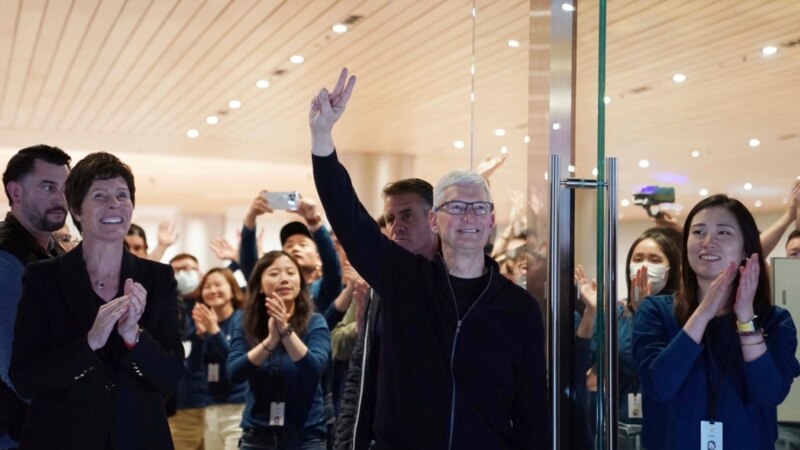
Tim Cook, chief executive of U.S. tech giant Apple, is facing domestic criticism for praising comments he made about China during a recent visit to boost sluggish iPhone sales in the lucrative market.
Cook attended the opening ceremony of China’s largest Apple retail store in Shanghai on Friday and met with Chinese political and business figures. He praised China as “so vibrant, so dynamic” and his remarks were widely quoted by state media and Foreign Ministry spokesperson Hua Chunying.
The new Apple store took seven years and cost more than 80 million yuan (approximately $11.1 million) to build. It is said to be the second largest in the world and the largest in Asia, with about 150 employees.
On Thursday night, at least 12 hours before the scheduled opening, there was already a long line in front of the store. Some media said the crowd was “as lively as New Year’s Eve.”
In addition to expressing their loyalty to the brand by purchasing Apple products, people rushed to take photos with Cook who was in the store on opening day.
Wall Street technology analyst Dan Ives said on X (formerly Twitter) that Cook’s trip to China shows that Apple will continue to attach importance to the Chinese market.
He said: “In the past year, Apple has actually been increasing its investment and retail footprint in China, and so far, Cook has been in China since last week on an important visit to lay the foundation for Apple’s future in China. Cook Reaffirm China’s strategy.”
Chinese media reported on Monday that Apple will partner with Chinese technology company Baidu to provide artificial intelligence capabilities for iPhones sold in China this year. Baidu has not verified the report.
However, not all Chinese people like Apple. A viral video on Chinese social media shows a middle-aged woman wearing yellow clothes, a baseball cap and a mask yelling at people queuing up the night before the opening of a new Apple store, “You worship foreigners and favor foreigners.” Foreign goods”. “.
She also said Apple expanded its business in China “because scumbags like you are willing to pay the price.”
The person in line said: “Do you know how many jobs Apple brings to China every year?”
The woman replied: “No, we have our own Huawei!”
The play reflects the challenges Apple faces in China. Official data showed that China’s iPhone shipments fell by about 33% year-on-year in February, marking the second consecutive month of decline.
According to data from the China Academy of Information and Communications Technology, the company’s total mobile phone shipments in January were approximately 5.5 million units, a decrease of approximately 39% from the previous year.
Frank Li, a senior partner at Blue Ocean Capital in Beijing, said that most Chinese iPhone users have a good experience with Apple products, so they remain loyal to the brand. However, due to competition with local Chinese brands, Apple product sales have shown a significant downward trend.
“I think Apple opening a store in Shanghai will play a role,” Li told VOA. [boosting] Although iPhone sales in China have declined, it cannot fundamentally reverse the overall slow decline trend of iPhone in China. ”
However, Cook expressed confidence in the Chinese market.He told Chinese media: “I love the people and culture here [of China]. Every time I come here, I’m reminded that anything is possible here. ”
Cook’s comments were criticized for glorifying the Chinese government’s arrogant attitude towards private companies.
Jonathan Eyal, deputy director of the Royal United Services Institute for Defense and Security Studies, wrote on X, “Apple’s Tim Cook says ‘anything is possible’ in China. Including being arrested and confiscated, and losing market at extremely low prices.” With the stroke of a bureaucratic pen. ”
Teresa Fallon, director of the Russian Eurasian Research Center, wrote that “Apple CEO Tim Cook’s fawning praise of China…is unlikely to turn the tide, and the CCP has stipulated that government officials cannot use Apple phones.”
Bloomberg reported last year that a growing number of Chinese government agencies and state-owned enterprises are ordering employees not to bring iPhones and other foreign-branded phones to the workplace. China’s Foreign Ministry did not confirm the report.
Some observers thought Cook’s comments were disingenuous. Apple has expanded production in India in recent years. Last year, India-made iPhones made their debut in the first batch of iPhone 15 models released globally.
But some people say that China is irreplaceable in the global supply chain. They pointed out that Apple has faced efficiency challenges since its supplier Foxconn moved production lines to India in the past few years.
U.S. current affairs columnist Noah Smith wrote: “Gee, at the same time, he is moving production out of China as fast as he can.”
Some criticism of Cook was harsher. Sophie Richardson, former China director at Human Rights Watch, said: “@tim_cook, what about the ‘vibrant’ and ‘vibrant’ #crimesagainst humanity… committed by your #China government hosts?”
Eli Friedman, an associate professor of global labor and work at Cornell University, said the mutually beneficial relationship between Beijing and U.S. businesses in the past no longer serves a diplomatic purpose.
“I guarantee that giving Apple some favors will not help stabilize U.S.-China relations,” he wrote.
Follow us on Google news ,Twitter , and Join Whatsapp Group of thelocalreport.in
















